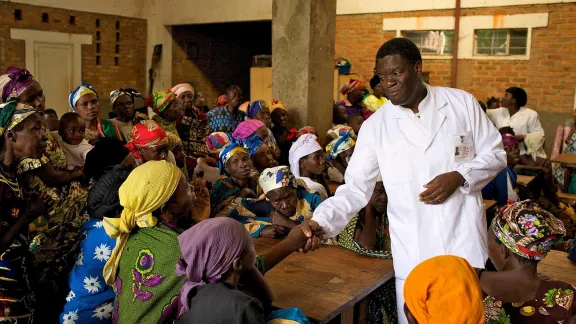
Dr Denis Mukwege with women at Panzi Hospital in Bukavu, Democratic Republic of the Congo. Photo: Torleif Svensson
Delegation visits Panzi hospital and pledges support to survivor network in Kasai region
(LWI) - On the International Day for the Elimination of Sexual Violence in Conflict, the Lutheran World Federation (LWF) attended an event organized by the sexual violence Survivor Movement in the Democratic Republic of Congo (DRC) and pledged to support the establishment of a survivor network in the Kasai region.
A delegation from the LWF’s DRC program, together with a staff member from the Communion Office and a survivor of sexual violence from the conflict-ridden Kasai, took part in the 19 June event which included a visit to the Panzi Hospital in Bukavu.
The hospital and Panzi Foundation, set up by Dr Dennis Mukwege, make use of a holistic approach to sexual and gender-based violence (SGBV), through medical care, psychological support, legal assistance and socio-economic empowerment of survivors of sexual violence.
Dr Mukwege was awarded the Nobel Peace Prize in 2018 in recognition of his campaign against sexual violence in conflict. He was also the inspirational keynote speaker during the LWF General Assembly in Windhoek in 2017.
Giving voice to survivors
After several decades of war, the DRC has hundreds of thousands of victims of rape and violence. In 2018, according to the victims, 60.57% of the aggressors were civilians and 39.43% were armed men. More than half of the victims treated at the Panzi hospital were raped by unknown civilians, who could be former soldiers or members of demobilized armed groups.
The International Day for the Elimination of Sexual Violence in Conflict aims to raise awareness of the need to stop conflict-related sexual violence, to honour the victims and survivors of sexual violence around the world and to pay tribute to all those who have courageously devoted their lives - or lost their lives - in standing up for the eradication of these crimes.
The Survivors Movement in the DRC currently has 2.000 members, including 60 men. It was created in 2017 to bring together survivors who speak out on their own behalf in the fight against sexual violence. The Movement helps all survivors to break the silence and fight for a Democratic Republic of Congo that is free of rape and sexual violence against women and men, girls and boys. It strives to ensure respect and protection of their rights, yet the stigma, shame and impunity make it hard for survivors to speak out.
Speaking out against stigma, shame and impunity
“This is the first time I am sharing my story with you in public. When I was raped by several militias in the Kasai, and I returned home, my husband and the community abandoned me, I lost my job as a teacher at a primary school and I was left alone with 3 young children,” said one of the survivors of the Kasai.
“After what happened I lost everything, my dignity and my life, and felt so alone.. I am grateful that LWF was there and supported me during these difficult times,” she said.
“I feel encouraged by the fact that I have been able to meet my sisters from the other provinces in the DRC, who went through the same difficulties as me. Together we can get strong again and continue our combat to end the suffering in silence,” she added.
After what happened I lost everything, my dignity and my life, and felt so alone. during those times. I am grateful that LWF was there and supported me during these difficult times
A year ago, the UN mission in the DRC, MONUSCO, reported that in December 2017, 66 people, including 2 women, 49 girls and 15 boys, were abducted in the Kasai Oriental province. Some hostages have been released, but many are still being held as sex slaves.
The situation of survivors of SGBV has been highlighted in a joint shadow report to the CEDAW Committee by the LWF, The Right Livelihood Award Foundation, the Mukwege Foundation, the Panzi Foundation and the Survivors Movement in the DRC. The report emphasizes the need to provide comprehensive prevention strategies and effective access to justice for survivors, as well as involving church leaders in the endeavour to promote zero tolerance for sexual violence.
This year, with support from Bread for the World, the LWF and the Panzi Foundation will establish a survivor network in the Kasai to tackle the enormous need to end sexual violence. The Kasai SGBV Survivors Movement will make it possible for the LWF, together with other partners, to bring these local issues to the national and international levels with the aim of protecting and improving women’s rights in the DRC.


